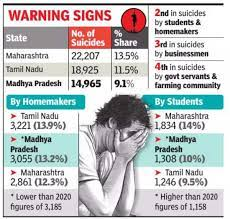In news– The Ministry of Health and Family Welfare has recently announced a National Suicide Prevention Strategy, the first of its kind in the country.
Key highlights of the policy-
- The strategy broadly seeks to establish effective surveillance mechanisms for suicide within the next three years
- It also seeks to establish psychiatric outpatient departments that will provide suicide prevention services through the District Mental Health Programme in all districts within the next five years.
- It aims to integrate a mental well-being curriculum in all educational institutions within the next eight years.
- It envisages developing guidelines for responsible media reporting of suicides, and restricting access to means of suicide.
- The stress is on developing community resilience and societal support for suicide prevention.
- While the strategy is in line with the WHO’s South East-Asia Region Strategy for suicide prevention, it says it will remain true to India’s cultural and social milieu.
- The strategy should now be passed on to the States for them to develop locally relevant action plans; and then cascade to the district, primary health and community levels.
Suicide cases in India-
- In India, more than one lakh lives are lost every year to suicide, and it is the top killer in the 15-29 years category.
- In the past three years, the suicide rate has increased from 10.2 to 11.3 per 1,00,000 population.
- The most common reasons for suicide include family problems and illnesses, which account for 34% and 18% of all suicide-related deaths.

Provisions on Suicide in India-
- Section 309 of the Indian Penal Code dictates the penal provision for attempting suicide.
- If a person is suffering from any mental trauma or illness, he or she should be given reformative treatment rather than a deterrent punishment which is “simple imprisonment for a term which may extend to one year [or with fine, or with both]”.
- India has retained much of the colonial legal legacy in its penal jurisprudence.
- But the fact is that the British Parliament decriminalised attempts to suicide in 1961 through the Suicide Act.
- In India, a Bill to repeal Section 309 was first introduced in the Rajya Sabha in 1972 but it failed to pass in the Lok Sabha because the House was dissolved.
Source: The Hindu














